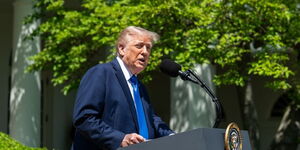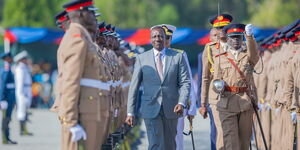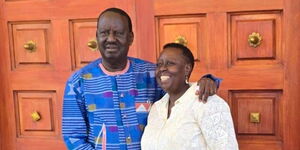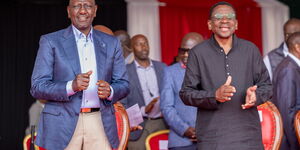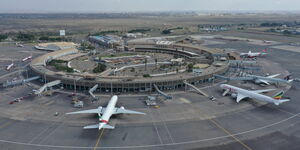A day after former Prime Minister Raila Odinga controversially issued a directive to the Mike Sonko-led Nairobi County Government, political analyst and University of Nairobi (UoN) don Herman Manyora spoke to Kenyans.co.ke revealing why he believes a path is being cleared for the opposition leader to take up a role in government after the Covid-19 pandemic.
In a high-profile meeting at his Capitol Hill office on Wednesday, April 15, Raila engaged Nairobi Metropolitan Services (NMS) Director General Maj. Gen Mohammed Badi, County Assembly Speaker Beatrice Elachi and the Majority and Minority leaders in the assembly.
After the meeting, he issued a statement which read in part; "I directed the county government to fully support the metropolitan services team to enable it to deliver where the county had failed."
Questioned by Kenyans.co.ke on whether Raila had the authority to issue such directives, his spokesperson Dennis Onyango told this writer; "Raila gave the directives and we expect the directives to be adhered to."
His statement was affirmed by Orange Democratic Movement (ODM) Communications Director Philip Etale who told Kenyans.co.ke that there was no mistake made in the statement posted on Raila's Twitter page as some had presumed.
Raila's directive came against the backdrop of a statement by Jubilee Party Vice-Chairman David Murathe, a close ally of President Uhuru Kenyatta, revealing his belief that, after the Covid-19 crisis, Kenya needed a government of national unity which Raila would be part of.
"This country needs a government of national unity post-Coronavirus. To bring people together so that all can focus on rebuilding the country.
"This country cannot work when you have this kind of antagonism and when you have some people whose only focus is 2022. The Deputy President only woke up when he felt his position in Jubilee is threatened.
"The former Prime Minister is a special envoy for the African Union on infrastructure which is a key part in connecting Africa and infrastructure. So in whatever we say, he has a role to play in the recovery of the economy after the Coronavirus crisis," Murathe told reporters after a meeting with Central Organization of Trade Unions (COTU) Secretary General Francis Atwoli and Raila at Idamat, Kajiado on Monday, April 13.
Analyzing the events, Manyora stated that Kenyans were likely being prepared to have Raila take up an formal role in government after the Covid-19 crisis.
Explaining his thoughts, Manyora noted that there was always a plan by Uhuru's camp to have Raila join the government either before or after the next elections in 2022, but recent events had forced them to accelerate the process.
Referencing a recent move by 146 lawmakers allied to Ruto to protest changes made to the Jubilee Party's National Management Committee, Manyora observed that Uhuru was being forced to lean more on Raila if only to retain the support of opposition members in Parliament.
He cited the Covid-19 pandemic as another catalyst that could see Raila formally join Uhuru's administration, noting that the government always reached out to the opposition in times of crisis.
"I think it looks like we're being prepared for this. There are two catalysts; the first is the Coronavirus situation in the country which requires all hands on deck. In times like this, the government works together with the opposition.
"For example during the Westgate terror attack in 2013 things were very hot politically, but you saw the opposition led by Raila working together with the government. So they would probably be working together anyway, this is war and during war people pull together.
"The second catalyst is the rift between Uhuru and Ruto in Jubilee. It's reached a point where we can't even call it a widening rift anymore because of how far it has gone. The differences have gotten to a point where Uhuru and Ruto are practically irreconcilable.
"Uhuru needs someone to help him and that's where Raila comes in. Raila joining the government was always on the cards, the question was whether to do it mid-stream or wait until 2022.
"Let me give you a good example, almost 150 Jubilee MPs have written to the Registrar backing Ruto who is fighting to control the party. If Raila didn't come in to support Uhuru with the opposition numbers in Parliament, don't you think it would have been a problem for Uhuru?
"This thing was always going to happen but these two catalysts mean Uhuru has found himself needing to lean on Raila more and more, and that is now what we are witnessing," he explained.
Doubts linger on how such an arrangement would work, however, as the 2010 Constitution does not envisage the opposition leader having a formal role in government.

